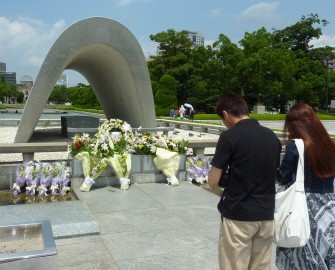HIROSHIMA, Japan, Aug 3, 2010 (AFP) - Sixty-five years after a mushroom cloud rose over Hiroshima, the United States will for the first time send an envoy this Friday to commemorate the bombing that rang in the nuclear age.
Its World War II allies Britain and France, both declared nuclear powers, will also send their first diplomats to the ceremony in the western Japanese city in a sign of support for the goal of nuclear disarmament.
Japan, the only country that has ever been attacked with atomic bombs -- first on August 6, 1945 in Hiroshima, and three days later in Nagasaki -- has pushed for the abolition of the weapons of mass destruction ever since.

United Nations Secretary General Ban Ki-moon, who arrives in Japan on Tuesday, will be the first UN chief to attend the ceremony.
UN spokesman Martin Nesirsky said Ban wanted to draw attention to "the urgent need to achieve global nuclear disarmament".
In Japan, a pacifist nation since its WWII surrender six days after the Nagasaki bombing, memories of the nuclear horror still run deep.
"Little Boy", the four-tonne uranium bomb detonated over Hiroshima at 8:15 am, caused a blinding flash and a fireball hot enough to melt sand into glass and vaporise every human within a one mile (1.6 kilometre) radius.
An estimated 140,000 people died instantly as the white-hot blast turned the city centre into rubble and ash, and in the days and weeks afterwards from burns and radiation sickness caused by the fallout dubbed the "black rain".
The death toll from the second bomb, the plutonium weapon dubbed "Fat Man" that hit Nagasaki on August 9, has been estimated at 70,000.
Japan surrendered on August 15, ending World War II in the Pacific.
The United States has never apologised for the twin attacks which, surveys show, most Americans believe were necessary to bring a quick end to the war and avoid a land invasion that could have been more costly.
Others see the attacks as unnecessary and perhaps experimental atrocities.
The US ambassador to Japan, John Roos, is due to attend and lay a wreath "to express respect for all of the victims of World War II", the US State Department said.
Since the end of the Cold War, worries have grown about the nuclear ambitions of states such as North Korea and Iran, and the threat of "non-state actors" such as militant groups getting the bomb.
US President Barack Obama outlined his long-term goal of a world free of nuclear weapons in an April 2009 speech in Prague that was cited as a key factor in his winning the Nobel Peace Prize.
"The existence of thousands of nuclear weapons is the most dangerous legacy of the Cold War," Obama said, stressing that "generations lived with the knowledge that their world could be erased in a single flash of light".
Pointing to the danger of terrorist groups acquiring the deadly technology, Obama said that "in a strange turn of history, the threat of global nuclear war has gone down, but the risk of a nuclear attack has gone up".
A year later, in April this year, Obama signed a nuclear arms reduction treaty with Russia and hosted a 47-nation summit that pledged to stop militant groups from acquiring fissile materials.
Many in Japan expect Obama to become the first US president in office to visit Hiroshima when he travels to Japan in October for an Asia-Pacific summit, after he earlier signalled an intention to do so.
The group Mayors for Peace, which now counts 4,069 local governments worldwide, last week reiterated its call on nations to immediately start talks for an international treaty to eliminate all nuclear weapons by 2020.
Two decades after the Cold War ended, the United States and Russia still have more than 22,000 nuclear warheads between them, and France, Britain, China, India, Pakistan and Israel have a combined total of about 1,000, says the International Commission on Nuclear Non-proliferation and Disarmament.
The global stockpile has a blast capacity of 150,000 Hiroshima bombs.







)
















